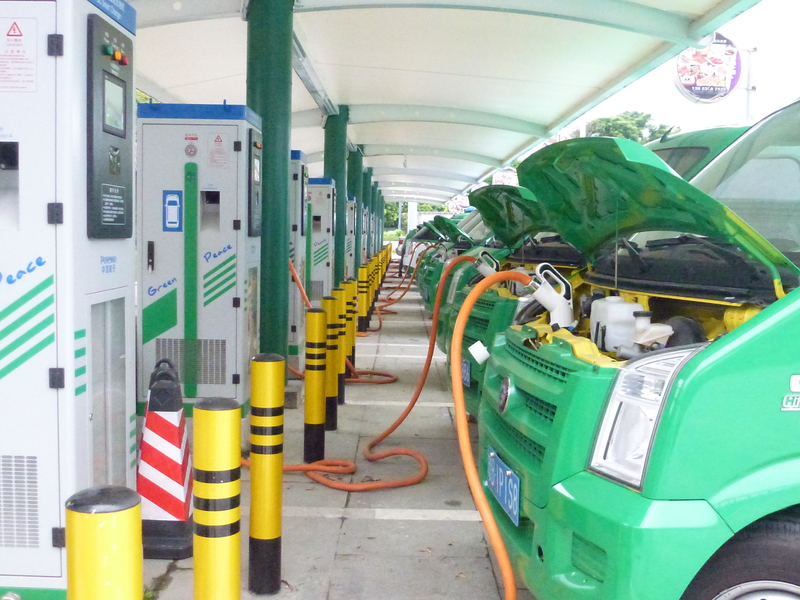Disruptive technologies such as electric vehicles will cause Chinas demand for engine oils to decline faster than expected, said Steven Zhang of Kline & Co. at a conference in Beijing last month.
China consumed around 4 million metric tons of vehicle lubricants in 2016, with 2.8 million tons required for motor oils alone, according to Zhang, the United States-based consultancys project lead for China, at the 18thChina International Lubricants and Technology Exhibition on Sept. 20. Yet the markets projected growth is flat or declining in coming years and may decline even faster in coming decades.
The Chinese government is aggressively trying to put more electric cars on the road through incentives and mandates for automakers, popular ride-hailing service companies and developers of autonomous vehicle technologies, Zhang continued.
According to Chinas Ministry of Industry and Information Technology, an agenda to ban all internal combustion engines from Chinese roads is under discussion among various private and public agencies and associations. See Lube Report Asias China’s EV-Only Future: Not If, But When for more information.
Electric cars dont use motor oils, Zhang proclaimed. Ride-hailing services and the growing adoption of high-quality synthetics largely prolong oil change intervals. All these factors will contribute to cuts in motor oil consumption.
Kline & Co. estimated that the frequency of drivers oil changes in China will drop to 1.3 per year in 2025 from the current 1.8.
Although many details are still up in the air, automakers are preparing for the impending shift. BMW AG, for example, is in talks with an undisclosed Chinese partner – rumored to be the state-owned Great Wall Motors – to manufacture electric cars in China under its MINI brand. Ford Motor Co. in August announced plans for a 50-50 joint venture with Zhejiang province-based Anhui Zotye Auto to produce fully-electric vehicles.
Volvo Cars, which is owned by Chinese conglomerate Geely Holding Group, has not yet launched a single fully-electric car model, but announced in July that all cars it develops from 2019 on will be partially or completely battery-powered.
Electric cars are currently just marginal in China, Zhang said. But they certainly will be part of a future that looks dim for motor oils.
Now may be the time for Chinese lube marketers to start exporting in earnest, other speakers alluded. Now that China allows the export of lubes and greases, companies should use the opportunity to look outside China, said Qian Kaini, a general manager of Zhuochuang Information, a Shandong-province consultancy.
Especially considering the One Belt One Road Initiative, Qian told the conference, Developing countries in Central Asia are in great need of infrastructure development, which eventually will benefit industrial lube suppliers. Motor oil producers should look at Southeast Asia, where Chinese automakers are expanding rapidly.
Shanghai-based SAIC Motor Corp., for example, is investing aggressively in the manufacturing and selling of passenger cars in Thailand and Indonesia. From their base in South Africa, Chinese manufacturers FAW Group Corp. and BAIC Group are slowly edging out multinational brands of commercial vehicles throughout the continent.
Modernization of these developing countries offers great opportunities for Chinese manufacturers across industries, including lubes and greases, Qian added.
With motor oils demand growth projected to dip, national oil company Sinopec is diversifying its research and development efforts to launch a wider array of products. While motor oils are still its core business, the company is also developing high-quality industrial lubes and greases to support Chinas Made in China 2025 initiative, which is pushing more Chinese equipment manufacturers to develop high-speed trains, robots and airplanes.
Expensive, highly-efficient machinery has to be fed with greases with great reliability, said Yao Lidan, a senior engineer for the lubricants arm of Sinopec. Sinopec will continue to develop such greases, targeting unmet demand in the market.
CNPC also branched out from a motor oils-dominated portfolio and recently began selling additives, which the state-run company previously only used in internal formulations. The world demands eco-friendly and fuel-efficient lubricants, which require additives to evolve accordingly, said Fu Xisheng, director of technology development at CNPC (China National Petroleum Corp.).

Photo: Waihs / Dreamstime